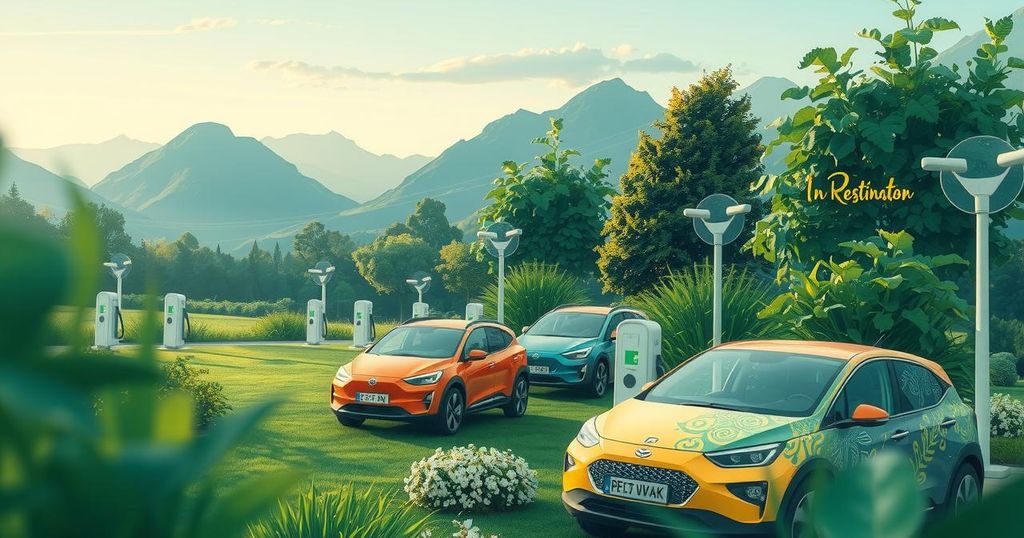Rwanda’s Rwf1.2 Billion Initiative to Establish a Carbon Market Enhances Electric Vehicle Adoption
Rwanda has launched a Rwf1.2 billion carbon market initiative to boost electric vehicle adoption and enhance sustainability. The project, backed by the Global Green Growth Institute and REMA, focuses on capacity-building and carbon credit projects across various sectors. With an estimated $900 million needed for EV adoption by 2030, the initiative seeks to encourage investment and facilitate Rwanda’s transition to a carbon-neutral economy.
The Rwandan government has launched a Rwf1.2 billion initiative to operationalize a carbon market, designed to enhance awareness and capacity among stakeholders, thus promoting electric vehicle (EV) adoption. Funded by the Global Green Growth Institute’s Carbon Transaction Facility and implemented in partnership with the Rwanda Environment Management Authority (REMA), the project will focus on developing high-quality carbon reduction initiatives across various sectors, including transport and waste management.
The initiative, known as the Rwanda Article 6 Readiness and Carbon Market Framework Operationalisation, proposes to support renewable energy initiatives. These projects will provide training in project identification and design while leveraging carbon credits. A carbon market allows the buying and selling of carbon credits, thus enabling emissions offsets for climate polluters, contributing to their compliance with climate targets.
Rwanda’s total funding needs for full-scale EV implementation are projected to reach $900 million by 2030. Investors will benefit from financial incentives linked to the amount of emissions reduced through participation in the carbon market. This framework is poised to stimulate private sector involvement, facilitating the transition to a carbon-neutral economy, especially as fossil fuel vehicles contribute significantly to pollution.
Srinivas Cheruvu, Managing Director of CFAO Mobility Rwanda, pointed out the cost-effectiveness of electric vehicles. For example, the BYD Dolphin electric car demonstrates a significant savings advantage for long journeys compared to traditional fuel vehicles. With ranges of up to 520 km per charge and convenient home charging options, EVs present an attractive alternative.
Cheruvu further highlighted the importance of tax exemptions in promoting EV adoption, anticipating that additional clean energy initiatives will bolster the sector’s growth. However, he acknowledged concerns from EV users regarding long charging times due to insufficient public fast-charging stations, often taking an hour for a full charge.
To address infrastructure challenges, Teddy Mugabo, CEO of the Rwanda Green Fund, mentioned that the fund is actively financing e-mobility companies to enhance the charging station network. Meanwhile, Faustin Munyazikwiye, Deputy Director General of REMA, emphasized that renewable energy projects are central to Rwanda’s strategy in the carbon market.
Collaborations with Singapore and Sweden aim to enhance the country’s capacity and project design. Through partnerships established under Article 6 of the Paris Agreement, Rwanda seeks to facilitate the trading of carbon credits beneficial for meeting climate objectives by 2030. At the upcoming COP28, Rwanda plans to present its National Carbon Market Framework, aimed at reducing greenhouse gas emissions effectively.
While there have been challenges in implementation, REMA is committed to addressing awareness gaps and improving the carbon market’s transparency. Munyazikwiye reaffirmed that this market is vital for attracting international investments and advancing sustainable development efforts. Caroline Raes, the GGGI Country Representative, noted the importance of equitable participation in carbon markets to foster investments and accelerate climate action.
The introduction of Rwanda’s Rwf1.2 billion carbon market project is poised to significantly enhance electric vehicle adoption across the country while promoting sustainable practices. Through collaborative efforts with international partners and the establishment of financial incentives, Rwanda aims to build a robust infrastructure conducive to a carbon-neutral economy. Although challenges regarding charging infrastructure remain, ongoing investments and initiatives signal a strong commitment to achieving substantial progress in reducing carbon emissions and promoting green technologies.
Original Source: www.newtimes.co.rw




Post Comment